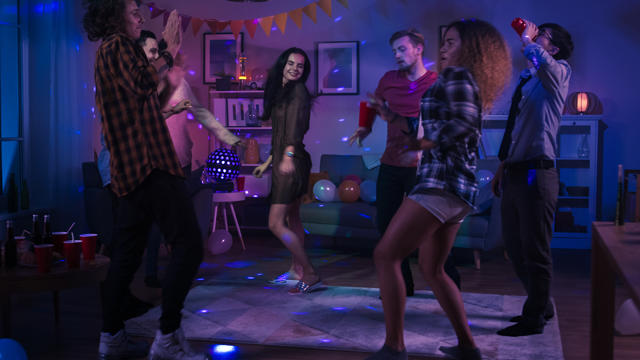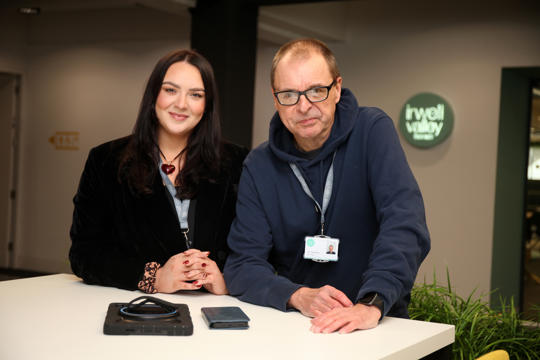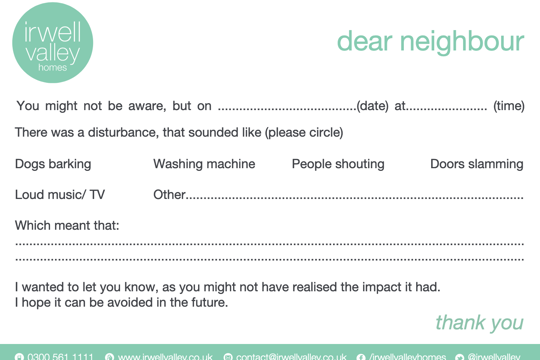
What is anti-social behaviour (ASB)?
Anti-social behaviour is conduct that causes or is likely to case a nuisance or annoyance. These are some examples of what is and isn't anti-social behaviour - the lists aren't exhaustive or exclusive.

What ASB is
Violence against people and/or property
Aggressive and/or threatening behaviour or language
Any type of hate behaviour that targets members of identified groups because of their perceived differences
Intimidation and/or harassment
Domestic violence or abuse
Alcohol or drug related ASB
Using a property for illegal or unlawful purposes eg. the production, storage and/or selling of illegal substances, the storage of stolen goods, prostitution
Excessive and persistent noise nuisance such as loud music

What ASB isn't
Noise from children playing, or babies crying.
General ‘living’ noise such as closing doors, going up and down stairs or people talking.
Cooking smells or odours
Noise from vacuum cleaners, washing machines or DIY at reasonable times.
Parking disputes.
Cats in gardens.
One off parties.
People gossiping in the street.
Disputes on social media.
Dirty looks or rude gestures.
Barking dogs (for short period of times).
How to report anti-social behaviour
You can report anti-social behaviour to us in the following ways:
- In person to your Neighbourhood Officer – find out who covers your area here.
- By emailing contact@irwellvalley.co.uk.
- By using the live chat function on our website here.
- By completing the form below.
- Using our mobile app – find out how to download it here.
- By calling us on 0300 561 1111.
Out of hours
To report an incident out of hours – after 5pm each weekday and over the weekend - please call 0300 561 1111.
If you are deaf or hard of hearing and unable to call us on the phone, you can use our out of hours Live Chat which can be accessed via the blue tab or black speech bubble on the right.
-
ASB policy
pdf | 142Kb
Serious Incidents
Serious incidents or threats of violence should be reported immediately to the police on 999.
To report a non-urgent incident to the police, call 101 or click the button below for more details of how to contact them.
If you witness a crime, you can report this anonymously to Crimestoppers on 0800 555 111.
Remember that in all instances, you can report anti-social behaviour anonymously.
Hate Crime
If you're worried about or experiencing hate crime please click below to find out what we're doing to tackle it and how you can report it.

We have two dedicated Community Safety specialist officers, who deal with high level or complex cases. Your Neighbourhood Officer will deal with the less complex cases of anti-social behaviour.
We will maintain the confidentiality of customers who wish to remain anonymous, and we will provide support to victims and witnesses of ASB. Anonymous reports will be recorded, and we will use our discretion and judgement in deciding if these warrant further investigation, as complaints made anonymously will restrict the scope of any investigation.
Where appropriate we will work in partnership with other agencies to prevent and resolve ASB in our neighbourhoods, and to support our customers effectively.

We need customers to work with us to resolve their complaint.
In the first instance, we will encourage you to speak to the person causing the issue if you feel able, and it is safe to do so. If you don’t feel comfortable doing this, we will ask you to use our Dear Neighbour card and post it through their door.
If you suspect there is a criminal activity, please contact the police as the first step, then contact us.
When you contact us we will ask you to provide accurate, detailed evidence of who is involved, what has happened, where and when the incident took place and how this has affected you. We will also ask for the names and addresses of any witnesses and details of any other agencies involved. This is to ensure we have enough information to investigate and that your case is allocated to the correct officer.
Our approach is to resolve matters at the earliest opportunity in order to maintain positive relationships for residents within our neighbourhoods. However, should legal action be required, you may be asked to make a statement and attend court with support and advice from us.

We will close a case when:
- You confirm the situation has improved.
- We've not heard from you for a period of time, despite attempts to contact you.
- We've spoken to you to explain that what is currently being reported would not be considered anti-social behaviour.
- Our investigations have not been able to uncover any supporting evidence to support your report.
- A legal order has been obtained (although we would monitor this for a short while afterwards to ensure the order is being complied with).
We'll contact you before we close the case to give you a summary of our investigation. This will tell you about the conclusions we've reached and the reasons why we're closing the case.
Anti-social behaviour case reviews
As part of our commitment to helping to create safe and peaceful neighbourhoods, we want to ensure our residents are aware of their rights and the tools available to tackle persistent ASB.
The Anti-social Behaviour, Crime and Policing Act 2014 introduced specific measures designed to give victims and communities a say in the way that complaints of antisocial behaviour are dealt with. This includes the ASB Case Review (formerly known as the ‘community trigger’), which gives victims of persistent antisocial behaviour the right to request a multi-agency case review.
You can read more about this below.
- What is an Anti-Social Behaviour Case Review?
- How does the process work?
- How can a case review help?

An ASB Case Review is a formal process designed to ensure that repeated reports of ASB are properly addressed.
It is here to help when:
- You are a victim of repeated ASB.
- You have reported this multiple times (usually 3).
- You are not satisfied with the response provided or you have not received a response.
Requesting an ASB Case Review brings together people from various organisations including housing providers, local councils, police, and other agencies to find a lasting solution.
This review is not about casting blame but is focused on improving communication and ensuring the different organisations involved work together more effectively to tackle the issues.
Once triggered, an ASB review calls for the different agencies to hold a partnership meeting to review:
- How the ASB case has been handled.
- What actions have been taken.
- How effective these actions have been.
- What else the partners can do to tackle the ASB and support the victim.
The person affected by the ASB has the right to have their views represented at the meeting when an action plan to tackle with ASB will be drafted and shared.
Each area chooses a lead agency to manage the process. This is usually the council or police.

When an anti-social behaviour case review is requested, agencies must decide whether the threshold for a review has been met and the outcome shared with the person affected.
The review encourages a problem-solving approach and is used to deal with some of the most persistent, complex cases of anti-social behaviour.
The focus of the review should always centre on the impact of the ASB on the person’s life. The process should allow for this information to be shared in the best way for that individual.
Steps in the process
- Make a Request: You can request an ASB Case Review through your local authority, who will act as the lead agency. Alternatively, you can contact us at Irwell Valley Homes, and we will help you navigate the process.
- Case Review Meeting: Once the review is initiated, all relevant agencies will come together to share information and assess the actions already taken. This collaboration ensures that no key details are missed and that any potential solutions are explored.
- Action Plan Development: If additional steps are needed, a clear action plan will be put in place to address the issues. We will work closely with you and all relevant partners to ensure progress is made.
- Feedback and communication: You will be kept informed throughout the process, receiving updates on the findings and the measures being taken to resolve the situation.

The ASB Case Review process is designed to empower residents who may feel their concerns are not being taken seriously. A multi-agency approach increases accountability and helps identify practical, effective solutions. We are committed to providing support at every step and ensuring your voice is heard.
If the threshold is not met
Although the formal procedures will not be invoked, it still provides an opportunity for the relevant bodies to review the case to determine whether there is more that can be done.
If you are experiencing persistent anti-social behaviour and believe your concerns have not been adequately addressed, please reach out to us – we are here to help and guide you through the ASB Case Review process.
You can also visit your local council’s website for further details – search ‘ASB case review’ or ‘community trigger process’ for more information.

